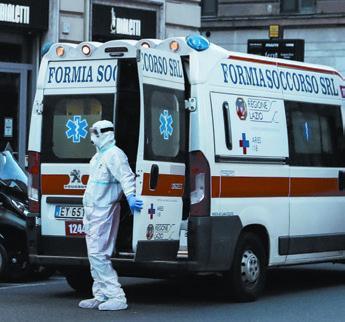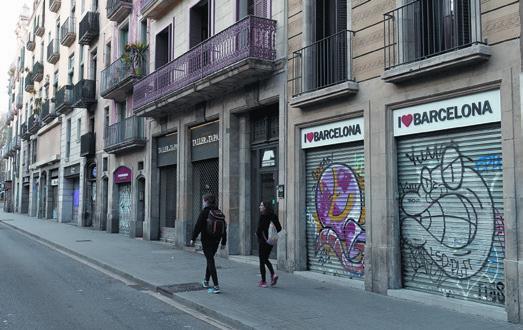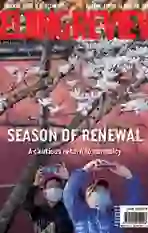Opportunity for A Better World
2020-04-01ByKerryBrown&ChengerDeng
By Kerry Brown & Chenger Deng
The novel coronavirus disease (COVID-19) is now a truly global crisis, which has spread from public health to the economy and governance. With more than 460,000 infections reported globally as of March 26 and the fatalities rising, its impact in Europe has been particularly hard. Italy, Spain and Germany have been profoundly affected.
Unprecedented measures have been implemented in parts of Germany, France and the UK. The U.S. too is starting to see widespread lockdowns. Most countries have sealed their borders to outsiders and ordered pubs, restaurants and cafes to close. Universities have moved their teaching online. Cases are occurring in Latin America and Africa.
Global efforts
The public health challenge has seen cooperation between health experts across the globe.Chinese doctors have helped those in Europe and elsewhere and medical staff in China have shared their experience with their foreign counterparts. There have also been examples of best practices shared between different countries, along with divergent measures taken to contain the spread of the disease. International collaboration is also occurring in the race to fi nd vaccines. This might presage a new era of global collaboration to an extent, and at a depth, on human health problems.
COVID-19 is also having a massive impact on the global economy.
Predictions range from a 20-percent drop in the GDP to something closer to a single digit; of either a recession, or a full-blown depression. The question is how deep this is, and how much of it can be combated. Interest rates are falling, stimulus packages are being launched. The proposed U.S. one comes to nearly a staggering $2 trillion.
In the UK, the government for the fi rst time ever has said it will pay the wages of those unable to work while social distancing policies are in place and companies have to close.
So far, however, the stock markets continue to show steep falls in value. Confi dence has fl ed because of the high amount of distrust, lack of confi dence and uncertainty.
But one phenomenon is evident. Borders have gone up between countries as never before since the end of World War II. Aviation companies are reeling, and many are asking for government bailouts. Once busy airports and train stations are almost empty. People are mostly staying at home, trying to prevent the further spread of the virus.
This seems like the start of the end of globalization as we know it. We are moving into a world with deeper boundaries, where localism and nationalism look set to become stronger. Yet it is hard to see how trade and service flows, which will be so crucial to restoring growth in the future,can be returned to almost pre-modern patterns. The model of globalization is evidently changing, perhaps in radical ways, but the phenomenon of globalization has to remain if we want to maintain anything like the life standards and progress the world has seen in human development over the last half a century.
A unified battle
It is absolutely essential at this crisis-ridden time to remember the fl ows of expertise and expert dialogue mentioned at the start of this article. The COVID-19 problem may be combated at the moment by putting barriers in place but it will be conquered by the exact reverse—with clear and free information and knowledge fl ows so that there can be a truly global response. A virus does not respect geographical borders. Nor do the other great challenges of our age—climate change and social injustice. If anything, the current challenges will ultimately make it clear that some elements of global communication and dialogue are not only invaluable, they are indispensable.This brings us to the ways in which the public health crisis, via its inevitable economic impact, will have a political impact. What is clear at the moment is that the world is being driven by voices keen to apportion blame, to seek political returns, and to make an opportunity out of what is happening. Some of this has turned deeply unpleasant, with racist attacks and fi erce verbal battles online.
People are anxious. It is understandable that emotions are running high. But reason and civility need to be maintained. COVID-19 is as immune to angry words and insults as it is to borders. Everyone needs to take a stand in opposing the manipulation of this current tragic situation for partisan political purposes. They need to remember that we are part of a common humanity, and that we will defeat challenges like this only by standing together, not driven apart. That is the most important gain that might come out of this—an acknowledgement of this fundamental human identity.
This is a united battle against a virus, not a chance for political gain and accusations. Solidarity and cooperation is the only way to tackle it. Fighting COVID-19 is not only the responsibility of governments and doctors, everyone plays a crucial part in this. By washing hands thoroughly, keeping social distance and covering the mouth when coughing, everyone is helping to control the spread of the virus. The virus will go away, but the hurt inflicted upon others during this crisis will stay. As an ancient phrase written in Chinese on the boxes of face masks donated by Japan for people in Wuhan read, “Shanchuan Yiyu, Fengyue Tongtian”—Even though we are miles apart, we share the same sky, see the same moon.
We should take this time to refl ect on how we treat others and how we coexist with other species on this shared planet.
This is not only a time of crisis, but it is also an opportunity to stay home, to read, to cook, to dine with family and to talk. It is a time for us to appreciate our common humanity, and to take time to understand each other better. It is a time for us to distinguish what are the essentials in life, to be kind to one another, and to use this immense issue as an opportunity to create from it eventually a better, more unified world, not one wracked by divisions, discord and enmity.
